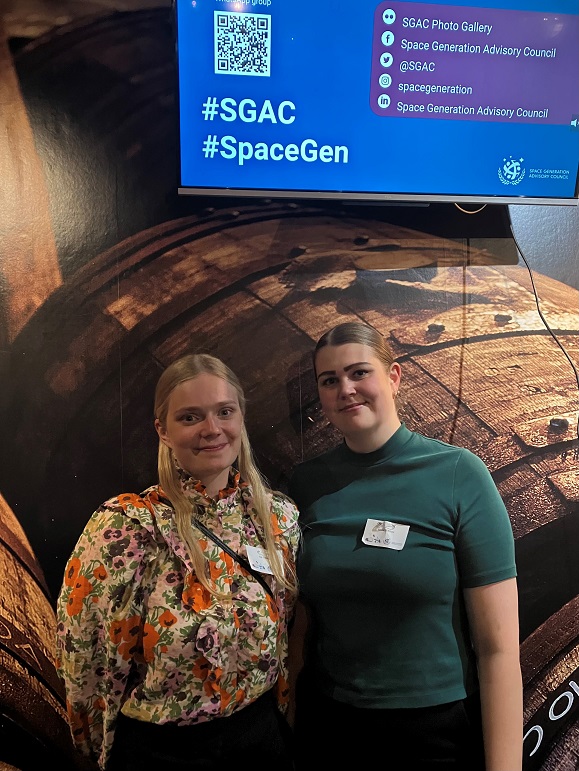Connecting Finland's next space generation: The future of the space sector was forged at SGAC Finland's first networking event
The first networking event of the Space Generation Advisory Council (SGAC) Finland gathered a large number of college students and young professionals on Friday evening, 28th of July. The diverse educational backgrounds of the participants reflect the versatility of the space industry.

SGAC Finland's National Points of Contact Tiia Tikkala and Kiira Tiensuu
On Friday evening, 28th of July, the upstairs of the Teerenpeli bar in Helsinki was slowly filled with space-themed chatter: The first networking event of SGAC Finland was about to start. The event was organised by SGAC Finland's National Points of Contact Kiira Tiensuu, project manager at the technology company ASRO, and Tiia Tikkala, who will start her Master's degree in space technology at the Technical University of Munich in autumn.
“We are positively surprised by the large number of participants”, they commented. Around thirty higher education students and young space professionals had signed up for this first networking event. The participants came from a variety of educational backgrounds: Alongside disciplines traditionally associated with the space sector such as astrophysics and space technology, the participants also represented the fields of legal sciences and the humanities. "The space sector needs professionals with diverse educational backgrounds. It's great that the space sector also interests young people," comments Tero Vihavainen, Chief Specialist of the Finnish Space Committee Secretariat.
The largest space network for young adults: active in over 165 countries
The Space Generation Advisory Council (SGAC) is a global non-profit organization that aims to represent college students and young space professionals aged 18-35 in the United Nations, the space industry, space organizations, and universities. Its main goal is to bring together young space actors and support them in developing and promoting their own policy positions. SGAC has over 25,000 members from 165 different countries, making it the world's largest space network for young adults. As stated on SGAC's webpage, its mission is to "enable and empower the young generation in advancing humanity through the peaceful uses of outer space”, which serves the organization's vision of a "peaceful and inclusive use of space for the benefit of all”.
Permanent observer member of the United Nations Committee on the Peaceful Uses of Outer Space (COPUOS)
Internationally, SGAC closely collaborates with influential space actors such as the European Space Agency (ESA) and the United States National Aeronautics and Space Administration (NASA). The organization also actively participates in the activities of the United Nations Committee on the Peaceful Uses of Outer Space (COPUOS). This goes back to SGAC's history, as it was originally established in Vienna during the United Nations Third Conference on the Exploration and Peaceful Uses of Outer Space (UNISPACE III) in 1999. As stated in the "Vienna Declaration, Space and Human Development", SGAC responds to the need for "a consultative mechanism to facilitate the continued participation of young people […] from all over the world in cooperative space-related activities".
In 2001, SGAC became a permanent observer member of COPUOS. The observer status has allowed SGAC's members to participate in numerous United Nations sessions and conferences. However, SGAC's involvement at the UN extends beyond its role as an observer: The organization influences UN space policies by presenting positions and research results generated by its project groups. As a member of the United Nations Economic and Social Council (ECOSOC), SGAC also takes part in the UN's annual General Assembly. Through its engagement in UN activities, SGAC draws attention to the perspective of the next space generation in the decision-making processes related to space affairs.
Mission statement: Connecting Finland's next space generation
SGAC's activities in Finland started this year. "Tiia and I got to know each other last autumn at the International Astronautical Congress in Paris. We were both involved in SGAC's activities to some extent, and at that time, we discussed how great it would be to bring SGAC's activities to Finland and establish a more active network in the space industry for young people," Kiira Tiensuu recalls the founding of SGAC Finland. "When the openings for the National Point of Contact positions were advertised at the end of the year, we both applied for the role of the Finnish contact person and were selected."
The networking event was SGAC Finland's first gathering. During the evening, Tiensuu and Tikkala provided an overview of SGAC and shed light on the organization's national and international activities. In Finland, more networking events are planned as well as the promotion of international opportunities within SGAC. The network also aims to introduce students to the space sector. There are also considerations for a joint Nordic event in 2025. "SGAC Finland is still in its early stages, and we warmly welcome event ideas," invite Tiensuu and Tikkala.
In addition to SGAC Finland's activities, Tiensuu and Tikkala presented SGAC's project groups, which delve into various areas of the space sector. These groups cover topics such as space business, space and equality, and space safety. Tiensuu and Tikkala also discussed SGAC's international events, including the annual Space Generation Congress or Space Generation Fusion Forum, held in conjunction with the International Astronautical Congress. The forum is organized within the framework of the annual Space Symposium, which is one of the largest international space events.
SGAC also offers professional and educational development opportunities aimed at providing equal access to the space industry. "Too often, professions in the space industry seem unattainable, and many abandon their dreams of pursuing space-related careers. By supporting young people enthusiastic about space matters, SGAC is doing really valuable work. The space sector must be accessible and space-related careers should be encouraged. It is not – only – rocket science", Tero Vihavainen comments on SGAC's activities.
Read more: https://spacegeneration.org/regions/europe/finland




